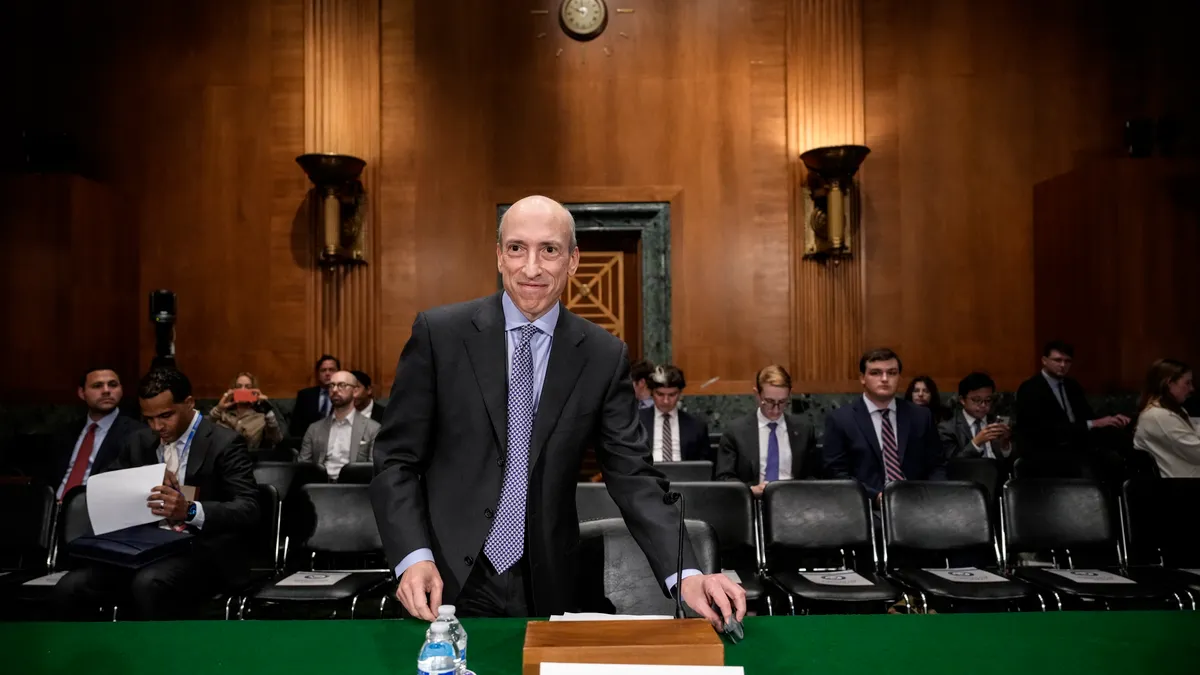Dive Brief:
- The Securities and Exchange Commission is voting Wednesday morning on a final version of its climate disclosure rule. Requirements for public companies to disclose scope 3 emissions are out, and requirements for companies to report scope 1 and scope 2 have been scaled back, according to the SEC’s fact sheet on the finalized rule seen by sister publication ESG Dive.
- Scope 1 and scope 2 emissions reporting requirements will also now be “phased-in” and only apply to large accelerated filers and accelerated filers, the SEC told reporters Tuesday afternoon.
- An SEC spokesperson said scope 3 was removed from the final rule due to a large number of comments it received concerning the cost of compliance, as well as the consistency and reliability of scope 3 data. The agency previously said it had received more than 16,000 comments since releasing its proposal, leading many experts and corporations to have doubts about scope 3 making the final cut in the rule.
Dive Insight:
As laid out in the March 2022 proposal, the SEC will require companies to disclose climate-related risks that “have had or are reasonable likely to have” material impacts for companies; any mitigation or climate adaptations they have undertaken “as part of its strategy;” the use, if any, of internal carbon prices, transition plans or scenario analysis; and processes related to oversight and management of climate risks. The rule, however, only applies to large accelerated filers and accelerated filers now.
The SEC defines large accelerated filers as companies with at least $700 million in shares held by public investors — as opposed to company representatives or stakeholders with a controlling interest — as of the most recently completed second fiscal quarter. Accelerated filers have more than $75 million but less than $700 million of shares held by the public as of the most recently completed second fiscal quarter. Such filers have been subject to reporting requirements for a calendar year, filed one annual report and are past revenue thresholds to be considered a smaller reporting company, as defined by the agency. Smaller reporting companies and emerging growth companies are both exempt from greenhouse gas emissions reporting, according to the fact sheet.
The SEC estimates 7,000 domestic companies will be required to report climate-related disclosures under the rule, as well as 900 foreign private issuers, according to an agency spokesperson. However, among those the agency estimated, around 40% of that domestic estimate and 60% of estimated foreign entities are large accelerated filers or accelerated filers. That smaller subset of companies in each group will then have to do a materiality assessment to determine whether its scope 1 and scope 2 emissions are deemed material to investors, the agency said.
The agency used the U.S. Supreme Court’s definition of materiality, which held in the 1976 case TSC Industries v. Northway, Inc. that a fact is “material” if there is “a substantial likelihood that the ... fact would have been viewed by the reasonable investor as having significantly altered the ‘total mix’ of information made available.”
While reporting disclosures for all companies will have different start dates depending on the size of the company, companies that are required to disclose their greenhouse gas emissions will also have a phased timetable to, first, report scope 1 and scope 2 emissions, then be able to receive limited assurance from an audit firm or other service provider before, ultimately, being expected to receive “reasonable assurance,” the fact sheet said.
The change is a notable departure from the agency’s original proposal in March 2022, which would have required all public companies to report their scope 1 and scope 2 emissions in their registrations and annual reports to the SEC. The agency’s fact sheet said the final rule continues its efforts to provide investors with “consistent, comparable, and reliable information” about the financial impacts of climate risks.
“The importance of climate-related disclosures for investors has grown as investors, companies, and the markets have recognized that climate-related risks can affect a company’s business and its current and longer-term financial performance and position,” the SEC’s fact sheet said.
The first year large accelerated filers will have to report scope 1 and scope 2 emissions — given they fall under the purview of materiality requirements — will be for the fiscal year beginning in 2026, with accelerated filers making their first disclosures for the fiscal year beginning in 2028. Limited assurance will be required beginning in 2029’s fiscal year for large accelerated filers and 2031 for accelerated filers. That is the highest level of assurance accelerated filers will need for their emissions reporting, while large accelerated filers will also need to get reasonable assurance on their emissions reporting starting the fiscal year that begins in 2033.
The bill will also create “a safe harbor from private liability” for climate-related disclosures, shielding companies from legal challenges over the transition plans, scenario analysis, use of an internal carbon price, targets and goals they submit to the SEC. The liability shield will not extend to historical facts and will only shield companies from litigation pertaining to future disclosures.
Additionally, the final rule removes requirements from the proposal for companies to describe board members’ climate expertise and delineate the impact of severe weather, other natural conditions and transition activity on each line item of a company’s consolidated financial statements.
The rule’s exclusion of scope 3 could prove complicated for companies from a compliance perspective. Domestically, California passed its own set of climate disclosure laws last year, including SB 253, which would require companies to report scope 3 emissions by 2027. While the SEC’s rule only applies to publicly traded companies by remit, California’s will apply to all businesses — public or private — that operate in the state and is expected to impact more than 5,300 companies. The European Union also passed its own set of reporting regulations — the Corporate Sustainability Reporting Directive — with more extensive scope 3 reporting and a double materiality component, which impacts large U.S. companies with EU subsidiaries.
Prior to the release of the final rule, Morgan Lewis partners Erin Martin and Celia Soehner, who both previously worked for the SEC, said in a statement to ESG Dive that without scope 3 in the rule, “companies also will need to consider how to comply with other, more stringent regulatory requirements.”
An SEC spokesperson said that while the agency can’t speak to the requirements of California’s disclosure rules or the CSRD, the effect of the other rules could lower compliance costs for companies.
If the SEC, which began considering the final rule at 9:45 am Eastern time, adopts the rule during Wednesday’s meeting, it will go into effect 60 days after it is entered into the Federal Register.
















